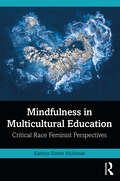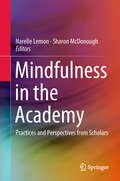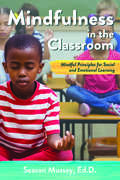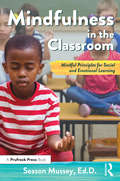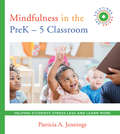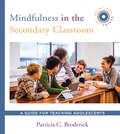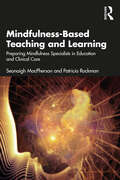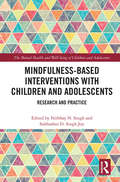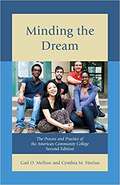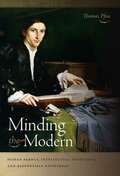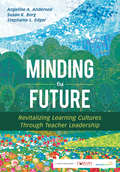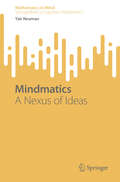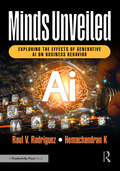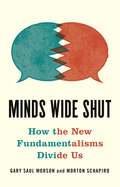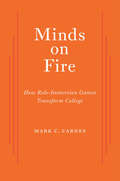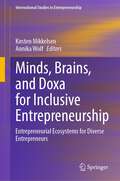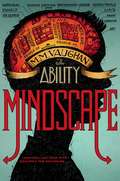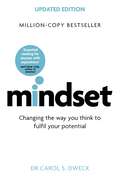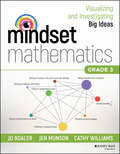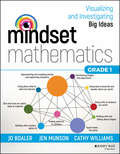- Table View
- List View
Mindfulness in Multicultural Education: Critical Race Feminist Perspectives
by Kathryn Esther McIntoshGrounded in critical race feminism, this book explores mindfulness as an empowering approach in multicultural education. The author explores how learners of multicultural education—by (re)centering the body through mindfulness with concrete strategies and scaffolded practice—can be empowered to handle the activated emotions and deep self-inquiry that come with the work of social justice, liberation, and anti-racism. This book includes counter stories of students of colors and offers both an epistemological and a curricular approach to mindfulness in multicultural education, including discussion of theory and key principles in addition to ten modules with practices to engage learners. These modules can be directly applied as the basis for curricular changes in teacher education and university-wide social justice courses, or they can be independently read by learners interested in enhancing their wellbeing and social justice. Written for teacher preparation and university social justice courses, this book encourages educators to contextualize their mindfulness practice within a critique of systems of oppression and ask questions about how mindfulness can empower action towards a more just society.
Mindfulness in Multicultural Education: Critical Race Feminist Perspectives
by Kathryn Esther McIntoshGrounded in critical race feminism, this book explores mindfulness as an empowering approach in multicultural education. The author explores how learners of multicultural education—by (re)centering the body through mindfulness with concrete strategies and scaffolded practice—can be empowered to handle the activated emotions and deep self-inquiry that come with the work of social justice, liberation, and anti-racism. This book includes counter stories of students of colors and offers both an epistemological and a curricular approach to mindfulness in multicultural education, including discussion of theory and key principles in addition to ten modules with practices to engage learners. These modules can be directly applied as the basis for curricular changes in teacher education and university-wide social justice courses, or they can be independently read by learners interested in enhancing their wellbeing and social justice. Written for teacher preparation and university social justice courses, this book encourages educators to contextualize their mindfulness practice within a critique of systems of oppression and ask questions about how mindfulness can empower action towards a more just society.
Mindfulness in the Academy: Practices And Perspectives From Scholars
by Narelle Lemon Sharon McDonoughThis book focuses on the way academics understand, embrace and enact the concepts of mindfulness in approaching their work in demanding and dynamic contemporary higher education environments. It examines how they implement formal and informal mindfulness practices that increase the capacity to transform mind and body states by drawing on concepts such as compassion, kindness, gratitude, curiosity, self-awareness and non-judgemental stances. The book provides insights into and highlights the struggles of scholars through their experiences and perspectives in relation to their identities, practices and job enactment. Each chapter author explains their mindfulness practices and their motivations for implementing them, and explores how mindful ways of researching, writing, learning and teaching, leading, and engaging with others leads us to self-awareness and engagement in the present.
Mindfulness in the Classroom: Mindful Principles for Social and Emotional Learning
by Season MusseyMindfulness can be used in the classroom as a method to increase overall teacher effectiveness, raise student achievement, and reignite the joy of teaching and learning. "Mindfulness in the Classroom" introduces eight mindful principles that support social and emotional learning for teachers and students in today's schools, leading to increased empathy, kindness, self-awareness, integrity, self-control, and honesty. The book provides an introduction and theoretical overview of mindfulness, followed by a discussion of the eight mindful principles. Research-based evidence is presented alongside differentiated teaching activities and classroom examples, helping to bridge the gap from theory to practice. Larger implications for schools and society are also discussed, including a call to use these principles to teach the whole child. Mindfulness in the Classroom offers teachers and students a guide for the journey back to the heart of teaching and learning.
Mindfulness in the Classroom: Mindful Principles for Social and Emotional Learning
by Season MusseyMindfulness can be used in the classroom as a method to increase overall teacher effectiveness, raise student achievement, and reignite the joy of teaching and learning. Mindfulness in the Classroom introduces eight mindful principles that support social and emotional learning for teachers and students in today's schools, leading to increased empathy, kindness, self-awareness, integrity, self-control, and honesty. The book provides an introduction and theoretical overview of mindfulness, followed by a discussion of the eight mindful principles. Research-based evidence is presented alongside differentiated teaching activities and classroom examples, helping to bridge the gap from theory to practice. Larger implications for schools and society are also discussed, including a call to use these principles to teach the whole child. Mindfulness in the Classroom offers teachers and students a guide for the journey back to the heart of teaching and learning.
Mindfulness in the PreK-5 Classroom (SEL SOLUTIONS SERIES): Helping Students Stress Less And Learn More
by Patricia A. JenningsTips and tools for promoting calm and focused attention in the classroom. This volume from the editor of the SEL Solutions Series provides a concise introduction to mindfulness for teachers and others who work in preschool and elementary-school settings. Each chapter includes simple, research- tested, practical activities that can be integrated into the school day to help kids calm down and pay attention.
Mindfulness in the Secondary Classroom (SEL Solutions Series): A Guide For Teaching Adolescents (sel Solutions Series)
by Patricia C. BroderickMindfulness includes qualities of mind and heart; it provides a strong foundation for other social and emotional skills. Mindfulness is making inroads into classrooms, as teachers seek ways to center and focus their own attention as well as that of their distracted students. Trish Broderick describes the particular relevance of mindfulness to the teaching of adolescent students, including its potential to alleviate stress, foster motivation, engagement, and compassion—and ultimately, to improve both learning and social relationships. Her book is a guide to applying mindfulness to day-to-day classroom challenges; every chapter contains authentic vignettes of secondary teachers and students, brief practices to try, and a set of takeaway points and reflection questions.
Mindfulness-Based Teaching and Learning: Preparing Mindfulness Specialists in Education and Clinical Care
by Patricia Rockman Seonaigh MacPhersonMindfulness-Based Teaching and Learning is the first comprehensive survey text exploring the history, research, theory, and best practices of secular-scientific mindfulness. With a focus on how mindfulness is taught and learned, this book is an invaluable resource for aspiring or expert mindfulness specialists. Integrating and defining the emerging field of MBTL within a common purpose, evidence-base, and set of transprofessional—and transformational—practices, the book provides both a visionary agenda and highly practical techniques and tools. Chapters provide curriculum design and teaching tips, explore the expert-validated MBTL-TCF competency framework, and reveal insights into the ways self-awareness can evolve into ecological awareness through intensive retreats.
Mindfulness-based Interventions with Children and Adolescents: Research and Practice (The Mental Health and Well-being of Children and Adolescents)
by Nirbhay N. Singh Subhashni D. Singh JoyThis book comprehensively reviews mindfulness-based interventions for specific areas of functioning in children and adolescents, with refreshing insights and perspectives. Based on a solid foundation of research and practice, it presents the nature of mindfulness, examines the psychological processes that may underlie mindfulness, and explores how to assess it. Mindfulness is about how we can be attentive to and present for everything that happens in our daily lives. This book draws upon current research in the field in order to explore topics such as the fundamentals of teaching mindfulness to children and adolescents; assessment of mindfulness in this population; use of mindfulness in educational settings; and clinical applications in mental health, including substance abuse, hyperactivity, and intellectual and developmental disabilities. With contributions from internationally-renowned clinicians and scholars, this book provides a balanced account of the strengths and weaknesses of current research, and how mindfulness-based programs can be used to enhance wellbeing and reduce suffering. This book will be of great interest for academics, scholars and post graduate students involved in the study of the mental health of children and adolescents. It will also appeal to psychologists, psychiatrist, nurses, social workers, rehabilitation therapists and others, such as school counsellors, who provide clinical care to children and adolescents.
Minding The Dream: The Process And Practice Of The American Community College
by Gail O. Mellow Cynthia M. HeelanMinding the Dream provides challenging, reflective, and practitioner-based information about community colleges that is data-based, clear and accessible for the general reader as well as the scholar. New employees, current leaders, graduate students, legislators, and boards of trustees need a grounded sense of the magnitude of the community college sector. Minding the Dream evokes the laudatory goals of the early pioneers of the community college movement, while accurately framing key programs and political conundrums challenging community colleges. Minding the Dream celebrates community colleges’ successes and is scrupulously honest about their failings. Community college leaders need honest information about what’s working and need to be challenged about the things that are not. State Legislatures and Congress need updated facts to assist them in making wise funding decisions regarding community colleges. Community college advocates need updated information to assist them in their advocacy work, and Higher Education programs need an updated book about community colleges to use as a basic text. These are the people who can benefit from reading Minding the Dream.
Minding The Modern: Human Agency, Intellectual Traditions, And Responsible Knowledge
by Thomas PfauIn this brilliant study, Thomas Pfau argues that the loss of foundational concepts in classical and medieval Aristotelian philosophy caused a fateful separation between reason and will in European thought. Pfau traces the evolution and eventual deterioration of key concepts of human agency―will, person, judgment, action―from antiquity through Scholasticism and on to eighteenth-century moral theory and its critical revision in the works of Samuel Taylor Coleridge. Featuring extended critical discussions of Aristotle, Gnosticism, Augustine, Aquinas, Ockham, Hobbes, Shaftesbury, Mandeville, Hutcheson, Hume, Adam Smith, and Coleridge, this study contends that the humanistic concepts these writers seek to elucidate acquire meaning and significance only inasmuch as we are prepared positively to engage (rather than historicize) their previous usages. Beginning with the rise of theological (and, eventually, secular) voluntarism, modern thought appears increasingly reluctant and, in time, unable to engage the deep history of its own underlying conceptions, thus leaving our understanding of the nature and function of humanistic inquiry increasingly frayed and incoherent. One consequence of this shift is to leave the moral self-expression of intellectual elites and ordinary citizens alike stunted, which in turn has fueled the widespread notion that moral and ethical concerns are but a special branch of inquiry largely determined by opinion rather than dialogical reasoning, judgment, and practice. A clear sign of this regression is the present crisis in the study of the humanities, whose role is overwhelmingly conceived (and negatively appraised) in terms of scientific theories, methods, and objectives. The ultimate casualty of this reductionism has been the very idea of personhood and the disappearance of an adequate ethical language. Minding the Modern is not merely a chapter in the history of ideas; it is a thorough phenomenological and metaphysical study of the roots of today's predicaments.
Minding the Future: Revitalizing Learning Cultures Through Teacher Leadership
by Angeline A. Anderson Susan K. Borg Stephanie L. EdgarHarness the power of teacher collaboration and engagement to see real results for students! Welcome to Transform Academy, where committed teachers become teacher leaders, empowered to revitalize learning cultures while keeping the future in mind. This boundary-breaking professional-learning process—centered on teacher voice and grounded in foundations of collaboration and data-informed planning—challenges schools to move beyond accountability standards and toward innovative learning that ignites student engagement. As you follow the story of Transform Academy, you’ll find accompanying action steps to help you implement the process, along with strategies to inspire personalized instruction and redesign learning environments. Other supports include: Detailed and inspiring vignettes Relevant research connections Questions for discussion Activities and prompts for individuals and teams Links to professional-learning standards Follow Transform Academy’s journey of discovery, and see the results for yourself. Minding the Future outlines a very clear framework for how a school might reimagine professional learning in support of results for students. What’s especially helpful are the tools and resources that will help educators through every step of the process. Thank you for bringing this great resource to the field! Frederick Brown, Deputy Executive Director, Learning Forward If you’ve been searching for proven strategies on creating a vision, planning, and establishing a learning culture ready for transformation, this is it. Written with knowledge only gained from experience, Minding the Future presents readers with clear plans, brought to life with anecdotes and stories, to lead their own professional learning transformations. This book is for educators wishing to embrace the future head-on and hand in hand! Linda Macias, Associate Superintendent, Cypress-Fairbanks ISD, Houston, TX
Minding the Future: Revitalizing Learning Cultures Through Teacher Leadership
by Angeline A. Anderson Susan K. Borg Stephanie L. EdgarHarness the power of teacher collaboration and engagement to see real results for students! Welcome to Transform Academy, where committed teachers become teacher leaders, empowered to revitalize learning cultures while keeping the future in mind. This boundary-breaking professional-learning process—centered on teacher voice and grounded in foundations of collaboration and data-informed planning—challenges schools to move beyond accountability standards and toward innovative learning that ignites student engagement. As you follow the story of Transform Academy, you’ll find accompanying action steps to help you implement the process, along with strategies to inspire personalized instruction and redesign learning environments. Other supports include: Detailed and inspiring vignettes Relevant research connections Questions for discussion Activities and prompts for individuals and teams Links to professional-learning standards Follow Transform Academy’s journey of discovery, and see the results for yourself. Minding the Future outlines a very clear framework for how a school might reimagine professional learning in support of results for students. What’s especially helpful are the tools and resources that will help educators through every step of the process. Thank you for bringing this great resource to the field! Frederick Brown, Deputy Executive Director, Learning Forward If you’ve been searching for proven strategies on creating a vision, planning, and establishing a learning culture ready for transformation, this is it. Written with knowledge only gained from experience, Minding the Future presents readers with clear plans, brought to life with anecdotes and stories, to lead their own professional learning transformations. This book is for educators wishing to embrace the future head-on and hand in hand! Linda Macias, Associate Superintendent, Cypress-Fairbanks ISD, Houston, TX
Mindmatics: A Nexus of Ideas (Mathematics in Mind)
by Yair NeumanMindmatics invites readers into a captivating exploration where the boundaries between mind and mathematics dissolve. Professor Neuman delves into the profound connections between cognitive processes and mathematical expression in this groundbreaking work. From how children grasp abstract concepts to symmetry's role in art and mathematics, this book uncovers the hidden structures that shape our understanding of the world. With insightful discussions on the relationship between poetry and mathematics and the essential role of the unconscious in fostering mathematical imagination, Mindmatics offers a unique perspective on the interplay of thought, creativity, and logic. This book is a must-read for anyone curious about the deeper links between the human mind and the mathematical universe.
Minds Online: Teaching Effectively with Technology
by Michelle D. MillerFor the Internet generation, educational technology designed with the brain in mind offers a natural pathway to the pleasures and rewards of deep learning. Drawing on neuroscience and cognitive psychology, Michelle Miller shows how attention, memory, critical thinking, and analytical reasoning can be enhanced through technology-aided approaches.
Minds Unveiled: Exploring the Effects of Generative AI on Business Behavior
by Hemachandran K Raul V. RodriguezThis book demonstrates how generative artificial intelligence (AI), a form of sophisticated AI technology, is transforming our knowledge of how the human mind functions in relation to business leadership and decision-making. It describes the most recent findings and applications of generative AI in psychology. The book explains the relationships between language, thinking, and behavior as well as how AI may aid in our understanding of learning, decision-making, and problem-solving. In addition, it discusses the significance of applying AI properly and ethically. This book provides a comprehensive overview of how AI is increasing our understanding of the mind and how it impacts each of us professionally.
Minds Wide Shut: How the New Fundamentalisms Divide Us
by Gary Saul Morson Morton SchapiroA timely exploration of intellectual dogmatism in politics, economics, religion, and literature—and what can be done to fight itPolarization may be pushing democracy to the breaking point. But few have explored the larger, interconnected forces that have set the stage for this crisis: namely, a rise in styles of thought, across a range of fields, that literary scholar Gary Saul Morson and economist Morton Schapiro call “fundamentalist.” In Minds Wide Shut, Morson and Schapiro examine how rigid adherence to ideological thinking has altered politics, economics, religion, and literature in ways that are mutually reinforcing and antithetical to the open-mindedness and readiness to compromise that animate democracy. In response, they propose alternatives that would again make serious dialogue possible.Fundamentalist thinking, Morson and Schapiro argue, is not limited to any one camp. It flourishes across the political spectrum, giving rise to dueling monologues of shouting and abuse between those who are certain that they can’t be wrong, that truth and justice are all on their side, and that there is nothing to learn from their opponents, who must be evil or deluded. But things don’t have to be this way. Drawing on thinkers and writers from across the humanities and social sciences, Morson and Schapiro show how we might begin to return to meaningful dialogue through case-based reasoning, objective analyses, lessons drawn from literature, and more.The result is a powerful invitation to leave behind simplification, rigidity, and extremism—and to move toward a future of greater open-mindedness, moderation, and, perhaps, even wisdom.
Minds Wide Shut: How the New Fundamentalisms Divide Us
by Gary Saul MorsonA timely exploration of intellectual dogmatism in politics, economics, religion, and literature—and what can be done to fight itPolarization may be pushing democracy to the breaking point. But few have explored the larger, interconnected forces that have set the stage for this crisis: namely, a rise in styles of thought, across a range of fields, that literary scholar Gary Saul Morson and economist Morton Schapiro call “fundamentalist.” In Minds Wide Shut, Morson and Schapiro examine how rigid adherence to ideological thinking has altered politics, economics, religion, and literature in ways that are mutually reinforcing and antithetical to the open-mindedness and readiness to compromise that animate democracy. In response, they propose alternatives that would again make serious dialogue possible.Fundamentalist thinking, Morson and Schapiro argue, is not limited to any one camp. It flourishes across the political spectrum, giving rise to dueling monologues of shouting and abuse between those who are certain that they can’t be wrong, that truth and justice are all on their side, and that there is nothing to learn from their opponents, who must be evil or deluded. But things don’t have to be this way. Drawing on thinkers and writers from across the humanities and social sciences, Morson and Schapiro show how we might begin to return to meaningful dialogue through case-based reasoning, objective analyses, lessons drawn from literature, and more.The result is a powerful invitation to leave behind simplification, rigidity, and extremism—and to move toward a future of greater open-mindedness, moderation, and, perhaps, even wisdom.
Minds on Fire
by Mark C. CarnesWhy are so many students intellectually disengaged? Faculty, administrators, and tuition-paying parents have been asking this question for nearly two centuries. And the answer is always more or less the same: students are so deeply absorbed in competitive social play (fraternities, sports, beer pong, World of Warcraft, social media) that they neglect academics. In Minds on Fire, Carnes shows how role-immersion games channel studentsâe(tm) competitive (and sometimes mischievous) impulses into transformative learning experiences. His discussion is based on interviews with scores of students and faculty who have used a pedagogy called Reacting to the Past, which features month-long games set during the French revolution, Galileo's trial, the partition of India, and dozens of other epochal moments in disciplines ranging from art history to the sciences. These games have spread to over three hundred campuses around the world, where many of their benefits defy expectations. Students think more critically by internalizing alternative selves, and they understand the past better by filtering it through their present. Fierce competition between opposing sides leads to strong community bonds among teammates and develops speaking, writing, leadership, and problem-solving skills. Minds on Fire is a provocative critique of educational reformers who deplored role-playing pedagogies, from Plato to Dewey to Erikson. Carnes also makes an impassioned appeal for pedagogical innovation. At a time when cost-cutting legislators and trustees are increasingly drawn to online learning, Carnes focuses on how bricks-and-mortar institutions of higher education can set young minds on fire.
Minds on Fire: How Role-Immersion Games Transform College
by Mark C. CarnesA Choice Outstanding Academic Title of the YearIn Minds on Fire, Mark C. Carnes shows how role-immersion games channel students’ competitive (and sometimes mischievous) impulses into transformative learning experiences. His discussion is based on interviews with scores of students and faculty who have used a pedagogy called Reacting to the Past, which features month-long games set during the French Revolution, Galileo’s trial, the partition of India, and dozens of other epochal moments in disciplines ranging from art history to the sciences. These games have spread to over three hundred campuses around the world, where many of their benefits defy expectations.“[Minds on Fire is] Carnes’s beautifully written apologia for this fascinating and powerful approach to teaching and learning in higher education. If we are willing to open our minds and explore student-centered approaches like Reacting [to the Past], we might just find that the spark of student engagement we have been searching for in higher education’s mythical past can catch fire in the classrooms of the present.”—James M. Lang, Chronicle of Higher Education“This book is a highly engaging and inspirational study of a ‘new’ technique that just might change the way educators bring students to learning in the 21st century.”—D. D. Bouchard, Choice
Minds, Brains, and Doxa for Inclusive Entrepreneurship: Entrepreneurial Ecosystems for Diverse Entrepreneurs (International Studies in Entrepreneurship #47)
by Kirsten Mikkelsen Annika WolfThis book explores ways in which inclusive entrepreneurship enhances bottom-up entrepreneurial activity for economic and societal transformation, particularly in remote areas. It focuses on the role of stakeholders in shaping a successful entrepreneurial ecosystem (doxa) and how entrepreneurial ecosystems in larger cities and urban regions differ from those in rural regions, which often have weaker economic infrastructures. It examines the relationship between the internal and external entrepreneurial ecosystems in higher education for fostering entrepreneurial mindsets. Topics such as women and diversity in entrepreneurship; social entrepreneurship and entrepreneurial education are explored. This integration of inclusive and emancipatory aspects in entrepreneurship research and practice is of benefit to researchers, scholars, academics, practitioners, and policy makers interested in and have a passion for (re)building entrepreneurial ecosystems.
Mindscape
by Iacopo Bruno M. M. VaughanTelekinetic preteens use their powers for good--and evil--in this mind-bending sequel to The Ability, which Publishers Weekly called a "fast-paced, superhero-tinged spy novel."Everywhere that Christopher Lane turns, he sees the face of the boy he killed. There is no escape from the guilt, not even on his return to Myers Holt--the secret London academy where he and five others are being trained to use their mental powers, their Ability. But now that the threat of Dulcia Genever has been dealt with, his friends are too busy working for the police, entering the minds of some of the country's most dangerous criminals, to sympathize. Chris's teachers are already concerned enough about him, especially when Chris starts to wonder if the boy may not be a figment of his imagination after all. Meanwhile, alone in Darkwhisper Manor, Ernest Genever is enjoying watching Chris's torment. Yes, he will keep his promise--Christopher Lane will die--but not until he has watched Chris lose his mind waiting for Ernest to appear. For, if nothing else, Dulcia Genever did teach her son one valuable lesson: Revenge is a dish best served cold.
Mindset - Updated Edition: Changing The Way You think To Fulfil Your Potential
by Dr Carol DweckWorld-renowned Stanford University psychologist Carol Dweck, in decades of research on achievement and success, has discovered a truly groundbreaking idea-the power of our mindset.Dweck explains why it's not just our abilities and talent that bring us success-but whether we approach them with a fixed or growth mindset. She makes clear why praising intelligence and ability doesn't foster self-esteem and lead to accomplishment, but may actually jeopardize success. With the right mindset, we can motivate our kids and help them to raise their grades, as well as reach our own goals-personal and professional. Dweck reveals what all great parents, teachers, CEOs, and athletes already know: how a simple idea about the brain can create a love of learning and a resilience that is the basis of great accomplishment in every area.
Mindset Mathematics: Visualizing And Investigating Big Ideas, Grade 3
by Cathy Williams Jo Boaler Jen MunsonEngage students in mathematics using growth mindset techniques The most challenging parts of teaching mathematics are engaging students and helping them understand the connections between mathematics concepts. In this volume, you'll find a collection of low floor, high ceiling tasks that will help you do just that, by looking at the big ideas at the third-grade level through visualization, play, and investigation. During their work with tens of thousands of teachers, authors Jo Boaler, Jen Munson, and Cathy Williams heard the same message—that they want to incorporate more brain science into their math instruction, but they need guidance in the techniques that work best to get across the concepts they needed to teach. So the authors designed Mindset Mathematics around the principle of active student engagement, with tasks that reflect the latest brain science on learning. Open, creative, and visual math tasks have been shown to improve student test scores, and more importantly change their relationship with mathematics and start believing in their own potential. The tasks in Mindset Mathematics reflect the lessons from brain science that: There is no such thing as a math person - anyone can learn mathematics to high levels. Mistakes, struggle and challenge are the most important times for brain growth. Speed is unimportant in mathematics. Mathematics is a visual and beautiful subject, and our brains want to think visually about mathematics. With engaging questions, open-ended tasks, and four-color visuals that will help kids get excited about mathematics, Mindset Mathematics is organized around nine big ideas which emphasize the connections within the Common Core State Standards (CCSS) and can be used with any current curriculum.
Mindset Mathematics: Visualizing And Investigating Big Ideas, Grade 4 (Mindset Mathematics)
by Cathy Williams Jo Boaler Jen MunsonEngage students in mathematics using growth mindset techniques The most challenging parts of teaching mathematics are engaging students and helping them understand the connections between mathematics concepts. In this volume, you'll find a collection of low floor, high ceiling tasks that will help you do just that, by looking at the big ideas at the first-grade level through visualization, play, and investigation. During their work with tens of thousands of teachers, authors Jo Boaler, Jen Munson, and Cathy Williams heard the same message—that they want to incorporate more brain science into their math instruction, but they need guidance in the techniques that work best to get across the concepts they needed to teach. So the authors designed Mindset Mathematics around the principle of active student engagement, with tasks that reflect the latest brain science on learning. Open, creative, and visual math tasks have been shown to improve student test scores, and more importantly change their relationship with mathematics and start believing in their own potential. The tasks in Mindset Mathematics reflect the lessons from brain science that: There is no such thing as a math person - anyone can learn mathematics to high levels. Mistakes, struggle and challenge are the most important times for brain growth. Speed is unimportant in mathematics. Mathematics is a visual and beautiful subject, and our brains want to think visually about mathematics. With engaging questions, open-ended tasks, and four-color visuals that will help kids get excited about mathematics, Mindset Mathematics is organized around nine big ideas which emphasize the connections within the Common Core State Standards (CCSS) and can be used with any current curriculum.
